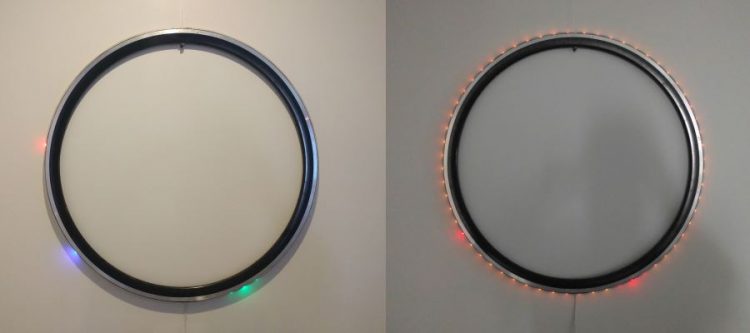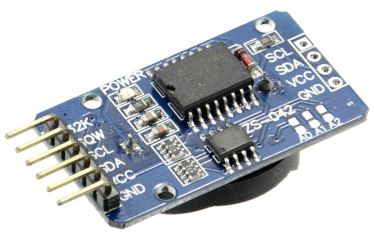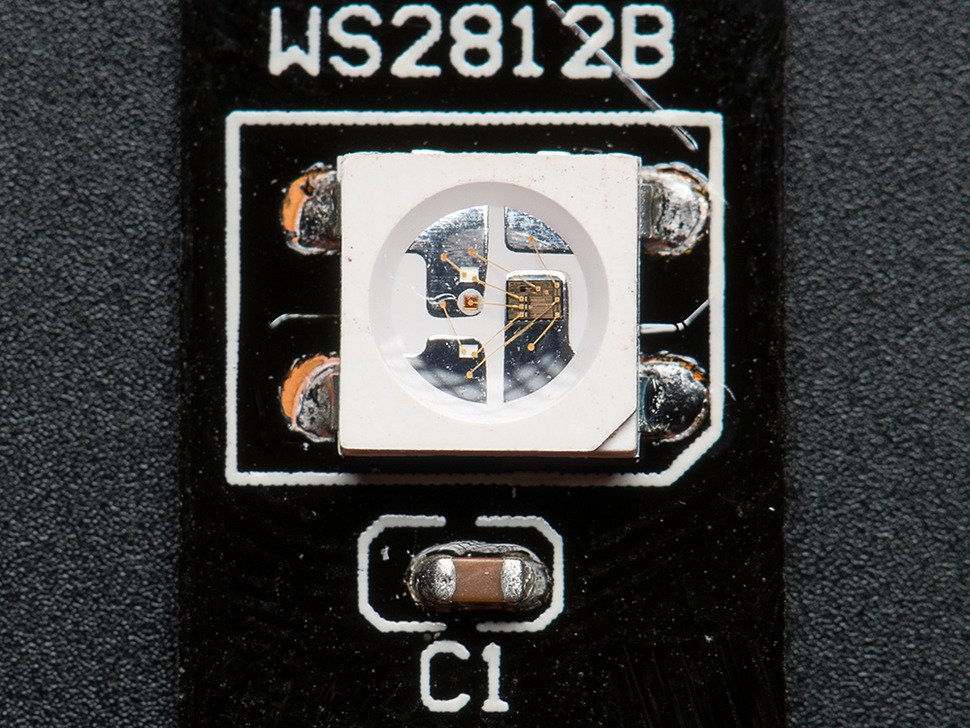
Arduino (Nano) RGB pixel LED clock
UPDATE
Now using Network Time Protocol (NTP)
https://coeleveld.com/nodemcu-esp8266-esp-12e-v1-0-clock/
Bicycle rim Hero Xr-1 27 inch (700mm) 20H clincher, black.
5mm thick (depron) foam strip for padding.
DS3231 High Precision Real-Time Clock Module (replacing I2C identical DS1307)
SMD pixel RGB strip (30 LEDs per meter, WS2812, 5050 LED)
// Code collected and completed by Tobias Floery <tobias@floery.net>
//SMD RGB pixel LED strip
// FastSPI Library from http://code.google.com/p/fastspi/
#include <FastSPI_LED.h>
// Adafruits RTClib from https://github.com/adafruit/RTClib
#include <Wire.h>
#include "RTClib.h"
RTC_DS1307 RTC;
// Sometimes chipsets wire in a backwards sort of way
//struct CRGB { unsigned char b; unsigned char r; unsigned char g; };
//struct CRGB { unsigned char r; unsigned char g; unsigned char b; };
struct CRGB { unsigned char g; unsigned char r; unsigned char b; };
struct CRGB *leds;
// Number of RGB Pixel for FastSPI
#define NUM_LEDS 60
// Datapin for FastSPI
#define PIN 11
// Datarate - valued 0 to 7. Choose a higher value if flickering occurs
//#define RATE 0
#define FILTER_LEN 8
// Brightness level
int level=15;
// Brightness correction for Leds
unsigned char bright[] = {0, 2, 4, 7, 11, 18, 30, 40, 50, 65, 80,96,125,160, 200, 255};
void setup()
{
Serial.begin(57600);
// init RTClib
Wire.begin();
RTC.begin();
// Following line sets the RTC to the date & time this sketch was compiled
/*
RTC.adjust(DateTime(__DATE__, __TIME__));
*/
// Setup FastSPI Lib
FastSPI_LED.setLeds(NUM_LEDS);
FastSPI_LED.setChipset(CFastSPI_LED::SPI_WS2811);
FastSPI_LED.setPin(PIN);
//FastSPI_LED.setDataRate(RATE);
FastSPI_LED.init();
FastSPI_LED.start();
leds = (struct CRGB*)FastSPI_LED.getRGBData();
// setup measurement for LDR
digitalWrite(A0, HIGH); // set pullup on analog pin 0
pinMode(A1, OUTPUT);
digitalWrite(A1, LOW);
}
unsigned int ldr=0;
void doLDR() {
unsigned int ldr_value = analogRead(0); //reads the LDR values
//Adjust for LDR variations.
//dark = 1023
//light = 0
//If your LDR for example reaches a max analogRead value of 350 instead of 1023 for 100% dark.
//unsigned int ldr_adjusted=map(ldr_value,0,350,0,1023);
unsigned int ldr_adjusted=map(ldr_value,0,700,0,1023);
//set max limit (to avoid potential 'divide-by-zero's).
if (ldr_adjusted >= 1023) ldr_adjusted = 1023;
//ldr follows ldr_adjusted, but is averaged so that values only change gradually
ldr = ((unsigned long)(FILTER_LEN-1)*ldr+ldr_adjusted)/FILTER_LEN;
unsigned int light_level=0;
//translate [0-1023] to [15-0]
//light_level = (1024-ldr)>>6;
light_level=map(ldr,0,1023,15,0);
if (light_level >= 15) light_level = 15;
if (light_level <= 1) light_level = 1;
//DEBUG SPI
// /*
Serial.println("ldr_value [0-???]:");
Serial.println(ldr_value);
Serial.println("ldr_adjusted [0-1023]:");
Serial.println(ldr_adjusted);
Serial.println("ldr:");
Serial.println(ldr);
Serial.println("light_level:");
Serial.println(light_level);
// */
//level=2;
level = light_level;
}
DateTime old;
void loop() {
// get time
DateTime now = RTC.now();
// DEBUG RTC
// /*
Serial.print(now.year(), DEC);
Serial.print('/');
Serial.print(now.month(), DEC);
Serial.print('/');
Serial.print(now.day(), DEC);
Serial.print(' ');
Serial.print(now.hour(), DEC);
Serial.print(':');
Serial.print(now.minute(), DEC);
Serial.print(':');
Serial.print(now.second(), DEC);
Serial.println();
// */
if (now.second()!=old.second()) {
old = now;
doLDR();
}
// clear LED array
memset(leds, 0, NUM_LEDS * 3);
if (level < 4) {
// this is the night mode
// set LED background
for (int i=0; i<NUM_LEDS; i++) {
leds[i].r = bright[level];
leds[i].g = (bright[level]+1)/2;
}
// set pixels
//leds[(now.second())%60].r = bright[level];
leds[(now.minute())%60].g = 0;
leds[(now.minute())%60].r = bright[level+2];
unsigned char hourpos = (now.hour()%12)*5;
leds[((59+hourpos)%60)%60].g = 0;
leds[(hourpos)%60].g = 0;
leds[((hourpos+1))%60].g = 0;
leds[(hourpos)%60].r = bright[level+2];
} else {
// set pixels
leds[(now.second())%60].r = bright[level];
leds[(now.minute())%60].b = bright[level];
unsigned char hourpos = (now.hour()%12)*5;
leds[((59+hourpos)%60)%60].g = bright[level/2];
leds[(hourpos)%60].g = bright[level];
leds[((hourpos+1))%60].g = bright[level/2];
}
// update LEDs
FastSPI_LED.show();
// wait some time
delay(500);
}
The FastSPI_LED library is no longer available and has evolved into the FastLED library with slightly different syntax. Use the following updated Arduino code:
// Original code by Tobias Floery <tobias@floery.net>
// Converted to FastLED by Tablelands Computers <info@tablelandscomputers.com>
// FastLED Library from https://github.com/FastLED/FastLED
#include <FastLED.h>
// Adafruits RTClib from https://github.com/adafruit/RTClib
#include <Wire.h>
#include "RTClib.h"
RTC_DS1307 RTC;
#define NUM_LEDS 60
#define LED_TYPE WS2812
#define DATA_PIN 11
#define COLOR_ORDER GRB
CRGB leds[NUM_LEDS];
// Filter averaging factor - higher value means more sluggish response to changes in ambient brightness
#define FILTER_LEN 8
// Brightness level initial value
int level=15;
// Brightness correction for Leds
unsigned char bright[] = {0, 2, 4, 7, 11, 18, 30, 40, 50, 65, 80,96,125,160, 200, 255};
void setup()
{
Serial.begin(57600);
// init RTClib
Wire.begin();
RTC.begin();
// Following line sets the RTC to the date & time this sketch was compiled
/*
RTC.adjust(DateTime(__DATE__, __TIME__));
*/
// Setup FastLED Lib
FastLED.addLeds<LED_TYPE,DATA_PIN,COLOR_ORDER>(leds,NUM_LEDS).setCorrection(TypicalLEDStrip);
// setup measurement for LDR
digitalWrite(A0, HIGH); // set pullup on analog pin 0
pinMode(A1, OUTPUT);
digitalWrite(A1, LOW);
}
unsigned int ldr=0;
void doLDR() {
unsigned int ldr_value = analogRead(0); //reads the LDR values
//Adjust for LDR variations.
//dark = 1023
//light = 0
//If your LDR for example reaches a max analogRead value of 350 instead of 1023 for 100% dark.
//unsigned int ldr_adjusted=map(ldr_value,0,350,0,1023);
unsigned int ldr_adjusted=map(ldr_value,0,700,0,1023);
//set max limit (to avoid potential 'divide-by-zero's).
if (ldr_adjusted >= 1023) ldr_adjusted = 1023;
//ldr follows ldr_adjusted, but is averaged so that values only change gradually
ldr = ((unsigned long)(FILTER_LEN-1)*ldr+ldr_adjusted)/FILTER_LEN;
unsigned int light_level=0;
//translate [0-1023] to [15-0]
//light_level = (1024-ldr)>>6;
light_level=map(ldr,0,1023,15,0);
if (light_level >= 15) light_level = 15;
if (light_level <= 1) light_level = 1;
//DEBUG SPI
// /*
Serial.println("ldr_value [0-???]:");
Serial.println(ldr_value);
Serial.println("ldr_adjusted [0-1023]:");
Serial.println(ldr_adjusted);
Serial.println("ldr:");
Serial.println(ldr);
Serial.println("light_level:");
Serial.println(light_level);
// */
//level=2;
level = light_level;
}
DateTime old;
void loop() {
// get time
DateTime now = RTC.now();
// DEBUG RTC
// /*
Serial.print(now.year(), DEC);
Serial.print('/');
Serial.print(now.month(), DEC);
Serial.print('/');
Serial.print(now.day(), DEC);
Serial.print(' ');
Serial.print(now.hour(), DEC);
Serial.print(':');
Serial.print(now.minute(), DEC);
Serial.print(':');
Serial.print(now.second(), DEC);
Serial.println();
// */
if (now.second()!=old.second()) {
old = now;
doLDR();
}
// clear LED array
memset(leds, 0, NUM_LEDS * 3);
if (level < 4) {
// this is the night mode
// set LED background
for (int i=0; i<NUM_LEDS; i++) {
leds[i].r = bright[level];
leds[i].g = (bright[level]+1)/2;
}
// set pixels
//leds[(now.second())%60].r = bright[level];
leds[(now.minute())%60].g = 0;
leds[(now.minute())%60].r = bright[level+2];
unsigned char hourpos = (now.hour()%12)*5;
leds[((59+hourpos)%60)%60].g = 0;
leds[(hourpos)%60].g = 0;
leds[((hourpos+1))%60].g = 0;
leds[(hourpos)%60].r = bright[level+2];
} else {
// set pixels
leds[(now.second())%60].r = bright[level];
leds[(now.minute())%60].b = bright[level];
unsigned char hourpos = (now.hour()%12)*5;
leds[((59+hourpos)%60)%60].g = bright[level/2];
leds[(hourpos)%60].g = bright[level];
leds[((hourpos+1))%60].g = bright[level/2];
}
// update LEDs
//FastLED.setBrightness(100);
FastLED.show();
FastLED.delay(500);
// wait some time
//delay(500);
}
Library Source Files:
RTClib-master
FastLED-master
Day mode
Night mode
For a final version of the code -including hour hand progression as the minutes fill the hour and 5 minute interval number marks:
// Original code by Tobias Floery <tobias@floery.net>
// Converted to FastLED by Tablelands Computers <info@tablelandscomputers.com>
// FastLED Library from https://github.com/FastLED/FastLED
#include <FastLED.h>
// Adafruits RTClib from https://github.com/adafruit/RTClib
#include <Wire.h>
#include "RTClib.h"
RTC_DS1307 RTC;
#define NUM_LEDS 60
#define LED_TYPE WS2812
#define DATA_PIN 11
#define COLOR_ORDER GRB
CRGB leds[NUM_LEDS];
// Filter averaging factor - higher value means more sluggish response to changes in ambient brightness
#define FILTER_LEN 8
// Brightness level initial value
int level=15;
// Brightness correction for Leds
unsigned char bright[] = {0, 2, 4, 7, 11, 18, 30, 40, 50, 65, 80,96,125,160, 200, 255};
void setup()
{
Serial.begin(57600);
// init RTClib
Wire.begin();
RTC.begin();
// Following line sets the RTC to the date & time this sketch was compiled
/*
RTC.adjust(DateTime(__DATE__, __TIME__));
*/
// Setup FastLED Lib
FastLED.addLeds<LED_TYPE,DATA_PIN,COLOR_ORDER>(leds,NUM_LEDS).setCorrection(TypicalLEDStrip);
// setup measurement for LDR
digitalWrite(A0, HIGH); // set pullup on analog pin 0
pinMode(A1, OUTPUT);
digitalWrite(A1, LOW);
}
unsigned int ldr=0;
void doLDR() {
unsigned int ldr_value = analogRead(0); //reads the LDR values
//Adjust for LDR variations.
//dark = 1023
//light = 0
//If your LDR for example reaches a max analogRead value of 350 instead of 1023 for 100% dark.
unsigned int ldr_adjusted=map(ldr_value,0,700,0,1023);
//set max limit (to avoid potential 'divide-by-zero's).
if (ldr_adjusted >= 1023) ldr_adjusted = 1023;
//ldr follows ldr_adjusted, but is averaged so that values only change gradually
ldr = ((unsigned long)(FILTER_LEN-1)*ldr+ldr_adjusted)/FILTER_LEN;
unsigned int light_level=0;
//translate [0-1023] to [15-0]
//light_level = (1024-ldr)>>6;
light_level=map(ldr,0,1023,15,0);
if (light_level >= 15) light_level = 15;
if (light_level <= 1) light_level = 1;
//DEBUG SPI
// /*
Serial.println("ldr_value [0-???]:");
Serial.println(ldr_value);
Serial.println("ldr_adjusted [0-1023]:");
Serial.println(ldr_adjusted);
Serial.println("ldr:");
Serial.println(ldr);
Serial.println("light_level:");
Serial.println(light_level);
// */
//level=2;
level = light_level;
}
DateTime old;
void loop() {
// get time
DateTime now = RTC.now();
// DEBUG RTC
// /*
Serial.print(now.year(), DEC);
Serial.print('/');
Serial.print(now.month(), DEC);
Serial.print('/');
Serial.print(now.day(), DEC);
Serial.print(' ');
Serial.print(now.hour(), DEC);
Serial.print(':');
Serial.print(now.minute(), DEC);
Serial.print(':');
Serial.print(now.second(), DEC);
Serial.println();
// */
if (now.second()!=old.second()) {
old = now;
doLDR();
}
// clear LED array
memset(leds, 0, NUM_LEDS * 3);
if (level < 4) {
// this is the night mode
// set LED background
for (int i=0; i<NUM_LEDS; i++) {
leds[i].r = bright[level];
leds[i].g = (bright[level]+1)/2;
}
// set pixels
//leds[(now.second())%60].r = bright[level];
leds[(now.minute())%60].g = 0;
leds[(now.minute())%60].r = bright[level+2];
unsigned char hourpos = (now.hour()%12)*5;
// To let the hour hand creep to the next hour as the minutes progress,
// for every 12 minutes offset the hourpos by 1 (= 1 LED).
if (now.minute() >= 12) hourpos=hourpos+1;
if (now.minute() >= 24) hourpos=hourpos+1;
if (now.minute() >= 36) hourpos=hourpos+1;
if (now.minute() >= 48) hourpos=hourpos+1;
leds[((59+hourpos)%60)%60].g = 0;
leds[(hourpos)%60].g = 0;
leds[((hourpos+1))%60].g = 0;
leds[(hourpos)%60].r = bright[level+2];
} else {
// light the number marks
leds[0].r = 2;
leds[15].r = 2;
leds[30].r = 2;
leds[45].r = 2;
leds[0].b = 5;
leds[15].b = 5;
leds[30].b = 5;
leds[45].b = 5;
leds[5].r = 2;
leds[10].r = 2;
leds[20].r = 2;
leds[25].r = 2;
leds[35].r = 2;
leds[40].r = 2;
leds[50].r = 2;
leds[55].r = 2;
leds[5].b = 5;
leds[10].b = 5;
leds[20].b = 5;
leds[25].b = 5;
leds[35].b = 5;
leds[40].b = 5;
leds[50].b = 5;
leds[55].b = 5;
// set pixels
leds[(now.second())%60].r = bright[level];
leds[(now.second())%60].g = 0;
leds[(now.second())%60].b = 0;
leds[(now.minute())%60].r = 0;
leds[(now.minute())%60].g = 0;
leds[(now.minute())%60].b = bright[level];
//hour=0, 1, 2, 3, 4, ... ,22, 23
//hourpos = 0, 5 ,10, 15 ,20, ... , 50, 55
unsigned char hourpos = (now.hour()%12)*5;
// To let the hour hand creep to the next hour as the minutes progress,
// for every 12 minutes offset the hourpos by 1 (= 1 LED).
if (now.minute() >= 12) hourpos=hourpos+1;
if (now.minute() >= 24) hourpos=hourpos+1;
if (now.minute() >= 36) hourpos=hourpos+1;
if (now.minute() >= 48) hourpos=hourpos+1;
leds[((59+hourpos)%60)%60].g = bright[level/2];
leds[(hourpos)%60].g = bright[level];
leds[((hourpos+1))%60].g = bright[level/2];
}
// update LEDs
//FastLED.setBrightness(100);
FastLED.show();
FastLED.delay(500);
// wait some time
//delay(500);
}
![]()

